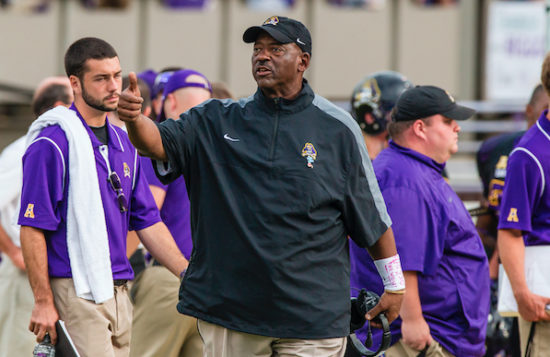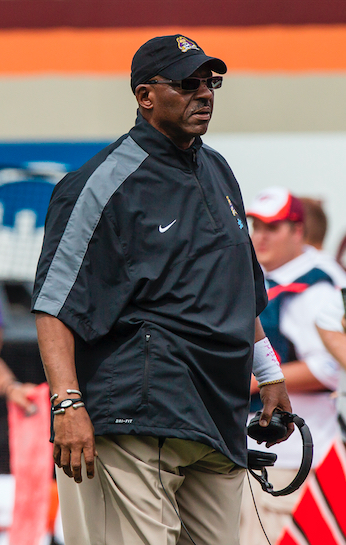The Purple & Gold Standard
Ruffin McNeill discusses East Carolina’s success, and why nothing’s better than coaching football

East Carolina University football coach Ruffin McNeill is a product of his environment, and that just happens to be perfect for a man determined to make his living on the sidelines.
The educator in him is always apparent, especially during a humid summer day in Greenville as he leads a football camp for local high school athletes. “Football comes third,” he tells nearly three dozen kids, preaching his belief in academics and environment before sports.
Coaching is as much about teaching as it is winning, and that’s what McNeill appreciates most about his job. The son of educators, he knew at a young age coaching was the ultimate way to blend his pleasures of football and teaching into one, and after more than 30 years on the field, he wouldn’t change it for the world.McNeill has compiled a 35-24 record in five seasons at East Carolina, leading the team to four bowl appearances. In 2013 the Pirates won 10 games, the second most in school history.
Coach & Athletic Director spoke with McNeill during the team’s November bye week. Here is what he had to say about coaching, teaching and leading one of the nation’s top offenses.
 You played at ECU, so what was it like coming back 30 years later as head coach?
You played at ECU, so what was it like coming back 30 years later as head coach?
It was the most humbling experience you can imagine. Two weeks before that I had just taken over for Mike Leach at Texas Tech in the Alamo Bowl, and it was one of the most challenging weeks of my life. We won the game, it was one of the most rewarding days of my life and then I didn’t get the (permanent) job and it was one of the lowest times. I had been there so long, so it was tough.
I can’t describe coming back to a place that helped shape me as a man. On top of that, coming home where my dad comes to every home game. We have 25 to 30 members that come to every home game, and at Texas Tech we’d be playing Oklahoma, Cotton Bowls and I’d have to give tickets away. They couldn’t come out that far.
Your dad was your high school football coach. Was that easier or tougher on you?
(Laughs) It was harder on me, but you already knew that, didn’t you?
I never knew why, but he had to let the rest of the kids know that this is my son but he won’t be shown any leniency. It really wasn’t the example to the rest to say he pushed his son like that. It was a teaching tool and the rest of the kids, because of that, knew they better do it the same way he’s telling Ruffin, because coach won’t let up on him just like he won’t let up on us.
You lost 34 lettermen coming into your first season at ECU, more than any other team in the nation. How did you find a way to become bowl eligible that year?
Not only that, instill your philosophy and what you believe in. That was a learning time because the staff and I knew each other and worked together, and we found quarterback Dominique Davis who understood the offense, so that helped.
It was a fight. My first game here as a head coach we won on a last-second touchdown against Tulsa. It started off with a bang, and to become bowl eligible was an honor and a great feeling. We didn’t play well in the bowl game, but our first year losing the most lettermen of anyone in the country, I was very proud of our team and proud of our staff. It was a good time and I wish we were playing well at the end, but it was a great learning experience for all of us.
You’re a defensive coach with one of the nation’s best offenses. How did that happen?
At Texas Tech, going against Mike Leach and the offense every day for 10 years, I like what it did. It gave me a chance to spread the field especially if you didn’t have as much talent as your opponent. You remember this, Oklahoma was rolling, Texas had great teams with Vince Young, Nebraska was very competitive. It gave us a chance to be in every game and win games too.
It goes back to when I was playing basketball for my dad. We were a fast-break team that applied pressure the entire game and at that time and a lot of guys played, we all rotated. That’s when I knew if I coached … that’s how I wanted to run an offense.
Football used to be a big man’s game, but today you see more emphasis on speed. How do you feel about that?
I like a speed game. Coach (Pat) Dye recruited us and we were a very fast football team, so I believe in speed and strength but I also believe in length. If you see our team you see long, athletic guys even on the offensive line. I like the fast-break part of it, I like the open field part of it, I like the length defensively and offensively, and that goes back to basketball and the length and speed of the game. I love it.
I’m a defensive guy, but I’m all for speeding up the game as fast as possible. As a defensive coach you have to learn to adjust.
Is that why you run the 3-4?
You got me figured out. It goes back to length and speed, our linebackers are tall and rangy but they can run and play well against a two-back offense and tight ends. I like it because you have eight guys standing up on two legs.
 Until this year, participation in high school football had been dwindling nationwide. What would you say to parents apprehensive in allowing their kids to play the sport?
Until this year, participation in high school football had been dwindling nationwide. What would you say to parents apprehensive in allowing their kids to play the sport?
I understand precaution, but I’d tell a parent playing on a team that relies on every man doing their job, it’s one of the greatest team sports there is. And the locker room is one of the greatest laboratories for a human behavior and development. It’s inside that locker room, there’s so many things in there from friendship to loyalty, judge and jury. It’s within that locker room you can make bonds with friends that will last forever. It also teaches you how to deal with success and failure, triumph and disaster and do it in a team-work setting with everybody pulling the same weight.
Has the spotlight on concussions changed the way you approach the game?
We run this as a family environment, and when I go into a kid’s home I’m responsible for a parent’s most prized possession. I take that very seriously.
I choose a family approach. Does that mean no discipline? No, it means the opposite, more discipline. Kids today don’t care how much you know until they know how much you care. And when they know how much you care, they’ll want to know how much you know. I love our kids, there’s a respect there, and anything that’s for the best interest of those kids, I’m going to do 100 percent or more.
Is coaching more about being a teacher as opposed to just being well-versed in Xs and Os?
Absolutely, coaching is teaching. My undergraduate degree is special education and my master’s is in counseling. You learn in working with kids that have learning disabilities that every kid learns differently, just like on the field. Some kids learn visually, some kids learn by writing on a board, some by walking through it, some you can just tell what you want and they can do it.
My brother and I are examples of that. If I had a test on Friday, I’d begin studying on Monday and Tuesday. My brother can look at it on Thursday, put it up and make an 80. Between us, my brother Reginald, it’s a direct correlation. Coaching and teaching, it’s one and the same to me.
You recently wrote a children’s book. Why did you make the decision to do that?
It goes back to my mom and dad, one of the tools they gave us is to be able to read. That’s one of my pet peeves is teachers are not paid enough. It’s one of the most needed professions in all the country but one of the most underpaid. My mom and dad had to have second jobs, and dad had to go to New Jersey and work as a bellhop and a cook and all that, my mom worked different jobs. But no matter how low the money got they always bought my brother Reginald and I a book.
Maybe I can save one kid or a bunch more by telling them it’s OK to hang with people who have your best interest at hand, who want to make it in life and are not looking for trouble but looking for success and achievement.
I always talk about the toolbox, and maybe this will equip a young boy or girl with another tool to keep in their toolbox to help be successful, and that’s the whole deal. It’s about the kids.
What would you say to other coaches out there who want to someday coach a Division I college program?
Stay with it, go visit and learn all you can. God gave you two eyes, two ears and one mouth for a reason. Go learn everything about the game from the ground up.
Once you pick a side of the ball you want to be on, be an expert at that side. Get to as many places and clinics as you can and when you get there, don’t sit in a room or a lobby. Go to each session and hear people talk and listen, because there’s a lot of ways to do this and there’s no one way to win this game. This is the greatest profession you could possibly be in. Every day we wear shorts and tennis shoes, a whistle and a hat and we’re around kids and we have a chance to stay involved in the game we love.
Our last question is a big one. You’ve coached in Texas and North Carolina. Who does barbeque better?
(Laughs) I got a real good answer for that. The pork barbeque chops, I have to go with Carolina, but the brisket chops, Texas. Both have their values.





